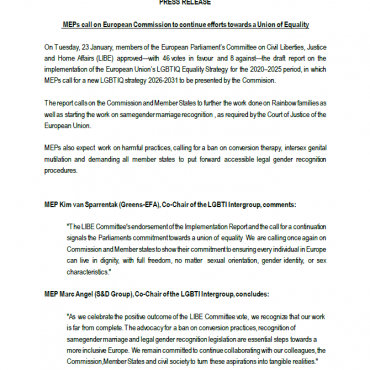MEPs welcome Ukraine’s new LGBT anti-discrimination clause
Today, the Ukrainian Parliament (Verkhovna Rada), voted to include provisions in the Labour Code which outlaw discrimination on the basis of sexual orientation and gender identity at the workplace.
 Other grounds, such as race, ethnicity, ability, social or foreign origin, age, health status, religion or belief and trade union membership, were already included in the non-discrimination framework.
Other grounds, such as race, ethnicity, ability, social or foreign origin, age, health status, religion or belief and trade union membership, were already included in the non-discrimination framework.
The amendment received support of 234 MPs, while 42 voted against.
The positive vote came as a surprise, as MPs voted down the same text twice in earlier votes on November 5 and November 10.
At several occasions, the European Parliament urged Ukraine to bring its anti-discrimination framework in line with European standards.
Amending the Labour code was one of the last hurdles for Ukraine to move to visa-free travel with the EU.
Sophie in ‘t Veld MEP, Vice-President of the European Parliament’s Intergroup on LGBTI Rights, reacted: “I congratulate the Verkhovna Rada for adopting this important anti-discrimination clause, which sends a message of hope to the LGBTI community in Ukraine.”
“It is clear that cooperation with the EU is based on shared values and the protection of human rights. This is a positive signal both to the people of Ukraine and to the citizens of the EU.”
“As LGBTI Ukrainians still face discrimination at work, this law is a small step forward. It brings Ukraine closer to Europe by explicitly forbidding discrimination, and providing a tool to fight inequality at the work floor.”
Ulrike Lunacek MEP, Co-President of the European Parliament’s Intergroup on LGBTI Rights, added: “Today the Verkhovna Rada sent a strong statement that a modern Ukraine respects and protects everyone equally.”
“This is a victory for all those who cherish the values of Maidan: freedom and human rights for everyone. I strongly encourage all political leaders, including those who voted against this law, to join in and speak out for equality and fundamental rights.”
Read more






